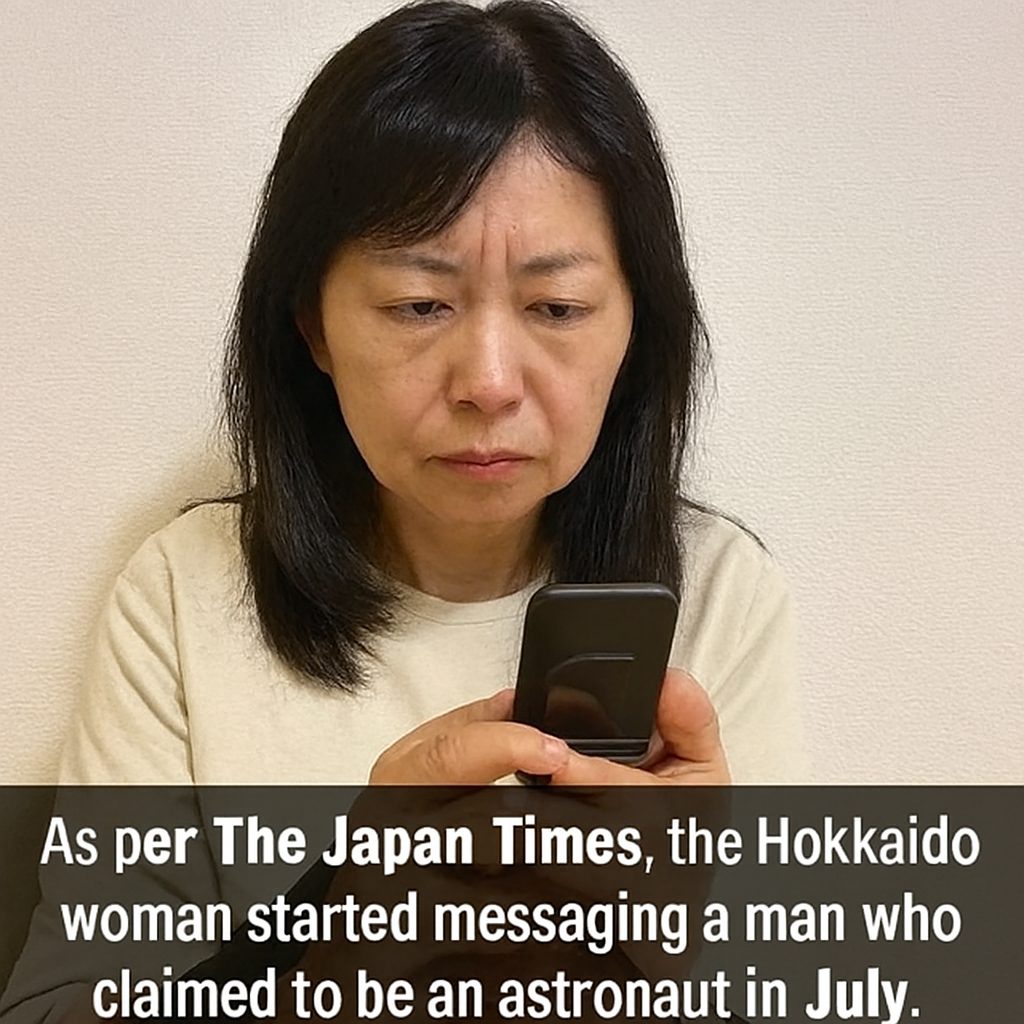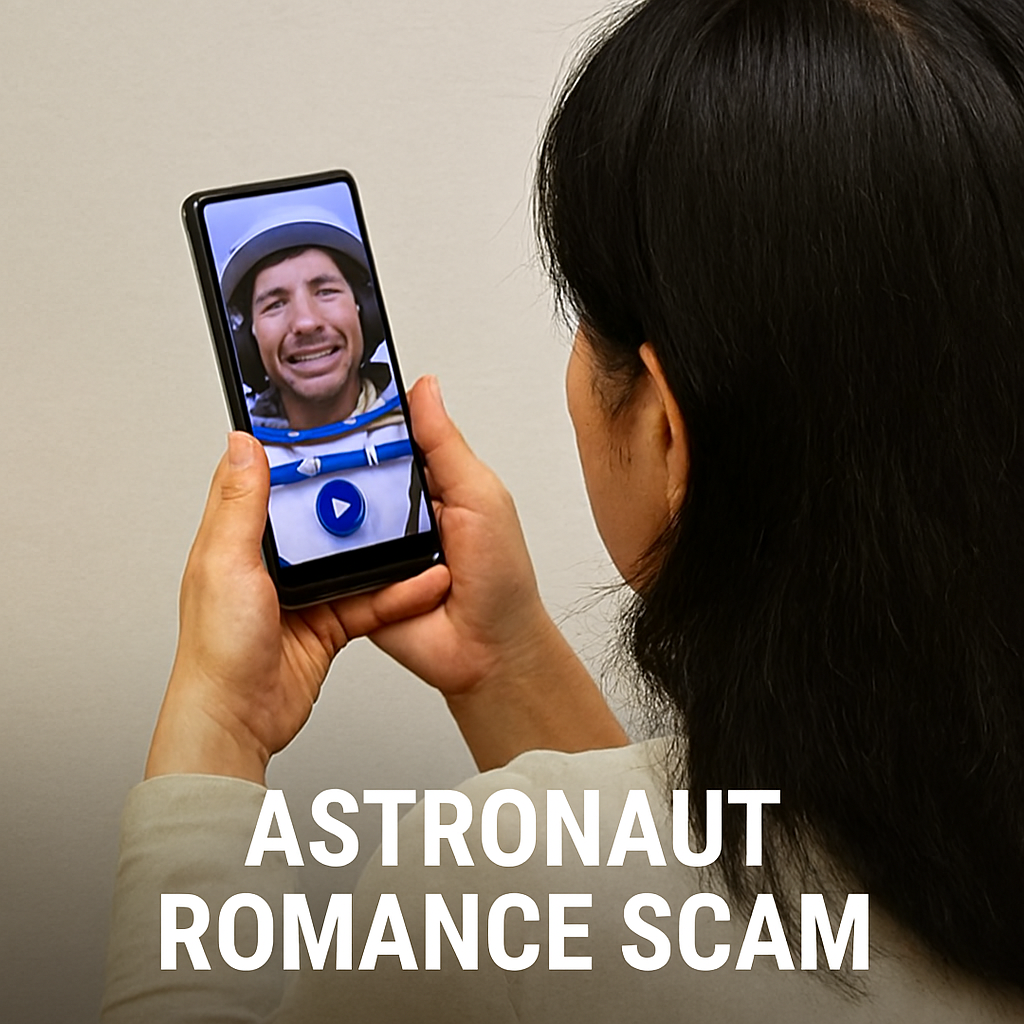A Japanese woman fell victim to an astronaut romance scam and lost about ¥1 million. Find out how the scam operates, how to spot the warning signs, and how to stay safe.
After meeting a stranger online, an 80-year-old woman in Japan fell prey to an astronaut romance scam. She donated money because she thought she was in a romantic relationship with a astronaut who was having problems. This account of an online romance scam Japan demonstrates how elderly scam victims are emotionally exploited. By being aware of this scam, others can steer clear of similar pitfalls.
Background
As per the Japan Times, the Hokkaido woman started messaging a man who claimed to be an astronaut in July. The man said that his life was in jeopardy and that he was in space on a spaceship.
He informed her that he really needed money to get oxygen since the ship was being attacked.
The case was handled like a romance scam by the police.
According to Malawarebytes, because they may feel lonely, have savings, and may not be skeptical of online interactions, scammers frequently target the elderly.
In order to get victims to take action, these emotional manipulation scams employ compelling narratives and pressing emergencies.
Japan is especially susceptible to senior internet fraud because of the country’s aging population.
Romance frauds are on the rise, according to authorities, particularly among those over 65.

Impact
The victim thought she was saving someone she loved, so she sent almost 㚥1 million, or about US $6,700.
Through their messages, she eventually developed an emotional attachment to them while living alone as per the Japan Times.
Communication was cut abruptly when the scammer disappeared after sending the money. In addition to her personal grief, the case stunned the Japanese people.
Authorities cautioned that vulnerable people can be duped by even the most unbelievable tales.
Many senior citizens started to be wary of putting their trust in online interactions.
The astronaut romance scam spread across the country as a warning about how emotional longing can be exploited by fake relationship fraud.

Scam Mechanics
Scammers start by gradually establishing trust through romantic promises and frequent messaging. They present themselves as sincere, compassionate, and seeking a close relationship. The con artist creates a crisis for instance, that he is in space and under attack or that his oxygen supply is failing once the level of emotional engagement is high.
They put pressure on the sufferer by highlighting their helplessness and urgency.
They then request money transfers.
In this instance, they advised her to use Japanese convenience store-based payment methods to send electronic money.
They might distribute requests across several transactions in order to prevent causing an instantaneous alarm.
The scammer disappears, bans contact, and leaves social media after obtaining money.
The fact that the entire relationship was fake is frequently discovered by victims too late.
Because it preys on loneliness and the need for connection, this kind of romantic scam is particularly effective.

Public / Media Reaction
This was reported by the Japanese and international media as a strange but terrible case of romance fraud. News sources used titles like “fake astronaut in space” and “astronaut scam” to draw attention to the story. The public’s response was mixed, with many expressing empathizes for the victim’s emotional state and others ridiculing her credulity. Authorities used the case to warn that you should suspect fraud if someone you meet online ever demands money. The evolution of scams, which use increasingly ludicrous tales to trick people, such as a stranded astronaut, was the subject of some debate. The media also emphasized how emotional weakness, especially in older people, contributes to these scams.

According to Times of India, globally, romance frauds are on the rise, and Japan recently saw a startling instance in Hokkaido. After falling for an astronaut romance scam, an elderly woman lost about one million yen. The con artist claimed to be in immediate danger while posing as an astronaut in orbit. With frequent talks, phony pictures, and assurances of friendship, he won her trust. He conditioned her to believe his made-up dilemma over the course of several weeks. He eventually requested payment for “oxygen” in order to survive on an attacking spaceship. Living alone, the woman sent the money out of fear for his life. She was distraught and didn’t realize she had been duped until much later.
Police in Hokkaido verified the case and warned of similar examples of online romance scams Japan. They cautioned the public to be wary of anyone requesting money online. Officials emphasized that loneliness and emotional needs are common reasons why elderly scam victims are targeted. They recommended that any suspect requests be reported right away. This risk is confirmed by global data. In 2023, 64,000 victims of romance scams were reported by the US Federal Trade Commission. Losses doubled from 2019 to surpass $1 billion. Scammers use social media, private chat, and dating apps to control people’s emotions. Now, lawmakers are pressuring tech firms to strengthen security measures. The major tool used in these emotional manipulation scams is still emotional weakness.
Prevention/Tips
- Always confirm your identity. Before putting your trust in someone, ask for evidence (a video call, official identification, several checks).
- If you have never met someone in person, don’t send them money. That is a warning sign for online romance scams Japan.
- Keep an eye out for critical crisis tales that demand money. They frequently indicate fake relationship fraud.
- Before donating money, ask friends or relatives for advice.
- Getting a second viewpoint is beneficial.
- Look up their photographs using reverse image search; if you discover the same image elsewhere.
- It might be a stolen or stock photo.
- Go slowly. If the connection picks up speed too quickly, be cautious.
- Before putting their trust in online suitors, elderly victims should look for signs such as avoiding in-person meetings and constantly making up excuses.
- Above all, have faith in your emotions. Stop and ask questions if something doesn’t feel right.
- Inform the local police about any questionable contacts. Reporting is encouraged by authorities in Japan in order to monitor trends.
Summary
The Japanese astronaut romance scam serves as an example of how emotional susceptibility can be exploited. An unrealistic story about oxygen and space tricked the elderly scam victim. However, scammers use haste and emotion manipulation to their advantage. People can safeguard themselves by learning about online romance scams Japan, identifying warning signs, and verifying claims before giving money. Your life savings shouldn’t be sacrificed for love.
